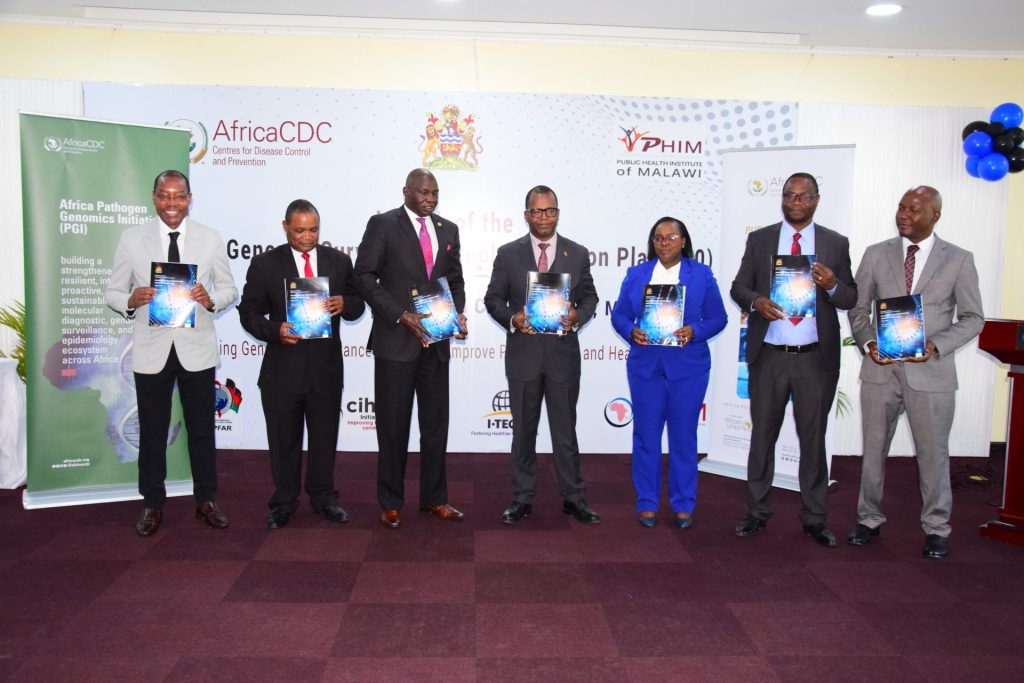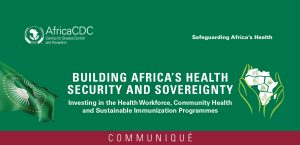Lilongwe, Malawi | July 8, 2025 — The Malawi Ministry of Health, launched its updated plan for the implementation of its Genomic Surveillance Strategy that was produced with technical support from the Africa Centres for Disease Control and Prevention – Africa Pathogen Genomics Initiative (Africa PGI) on 3 July.
As pathogen genomics provides a powerful approach towards the investigation, management, and surveillance of infectious diseases, the plan is geared to include integration of multi-pathogen genomic surveillance into existing public health systems, research and development.
The second version of the plan is aligned to Africa CDC Pathogen Genomics Surveillance Policy Framework and identified priority list of pathogens and use cases for genomic surveillance in Malawi and the region. The strategy has a robust, comprehensive, fully integrated, harmonized and well-coordinated mechanisms to guide monitoring of the implementation of the plan and evaluate impact. The improved plan has a National Genomics Committee comprising of a steering committee, advisory group and laboratories from public, private and academia. The first genomic strategy was launched in 2023 and runs to 2030
In his opening remarks, Secretary for Health Dr. Samsom Kwazirira Mndolo emphasized the critical role of genomics in monitoring antimicrobial resistance, disease outbreak detection, response and prevention as well in precision medicine.
He underscored the role of the plan as a roadmap for implementing a robust one health genomic surveillance system across the country with different multi stakeholders, ministries and partners.
“We have been front runners in genomics, but we lost the opportunity to learn from others, so we decided to revisit and update the 2023 plan,” said Dr Mndolo.
“This moment marks the dawn of a new era, where science, innovation, and determination converge to build a stronger, more resilient health system for all starting from Malawi by leveraging genomic sequencing power to identify and track pathogens enabling early detection, tracking and characterization of pathogens,” said Dr Lul Riek, Director for the Southern Africa Regional Coordinating Centre.
Dr Riek said by integrating pathogen genomic sequencing into its healthcare infrastructure, it aims to enhance its health security and swiftly respond to emerging and reemerging threats effectively. “This makes Malawi one step ahead of other countries in disease detection and response,” he said.
“In the face of several emerging and reemerging health threats including Disease X ” a hypothetical emerging pathogen, from the COVID-19 pandemic to the resurgence of Mpox, Marburg, Cholera and other epidemics, we have witnessed firsthand the urgent need for resilient public health surveillance systems that can provide timely and actionable data,” said Dr Francis Chikuse, Senior Technical Officer for Public Health at Africa CDC.
“The National Multi Pathogen Genomic Surveillance Strategy is not just a response to these challenges but a proactive step toward building a robust system that leverages the power of molecular diagnostics and sequencing to safeguard the health of the of Malawians and beyond,” said Dr Chikuse.
He said, Africa CDC in partnership with public, private and philanthropic sectors is enhancing continent-wide sample referral and data sharing strategy, systems, and governance to promote trusted, quality assured and timely data sharing as well as support the design and pilot implementation of high-impact public health priority genomic surveillance and use-cases and facilitate the utility of genomics data for policy, decision making, research and development of pandemic materials. In 2025, the World Health Assembly adopted the historic Pandemic Agreement to enhance global collaboration and to create a more equitable response to future pandemics.
Africa CDC is working with 16 Member States including the Democratic Republic of Congo, Uganda, Mozambique, Ethiopia, Cameroon, Malawi, Zambia, Republic of Congo, Zimbabwe, Ghana, Morocco, Togo, South Africa, Tanzania, Rwanda, Namibia, to develop their national pathogen genomics strategies. Through this collaboration, Malawi becomes the second country after Zambia to launch their genomic strategy.
###
About Africa Centres for Disease Control and Prevention (Africa CDC)
The Africa Centres for Disease Control and Prevention (Africa CDC) is a public health agency of the African Union. It is autonomous and supports member states in strengthening health systems. It also helps improve disease surveillance, emergency response, and disease control. Learn more at: http://www.africacdc.org and connect with us on LinkedIn, Twitter, Facebook and YouTube
For more information and media inquiries
Margaret Edwin | Director of Communication and Public Information | Africa CDC EdwinM@africacdc.org







